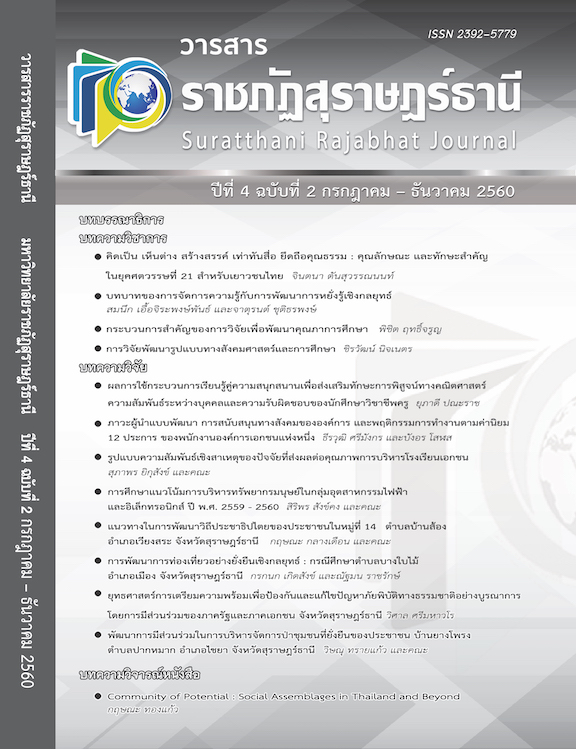Model Development Research in Social Sciences and Education
Main Article Content
Abstract
A model is a representation or abstraction of an actual object or situation. In social sciences and education, a model is a simplification of some phenomenon for purposes of study and understanding. Mostly, a model comprises of at least 6 components which are goal or objective, related variables or factors, system or structure, mechanism or processes, information and technology, and context of the model. Model development assists researchers in relating more accurately to reality. It also aids them to describe, predict, test or understand complex systems or events. There are various processes or methodologies that are being selected for the development of a model. Otherwise the main parts of model development are model construction and model validation. The model formation can be created by a number of techniques i.e. documentary analysis, in-depth interview, content analysis, exploratory factor analysis, Delphi technique, path analysis etc. in order to collect related data and ideas and form the tentative model. Then the proposed model would be validated in quantitative and/or qualitative approaches by a variety of techniques to confirm its possibility, appropriateness or relevance, such as connoisseurship, ethnographic future research, public hearing, focus group discussion, or R&D of that model. Validation or reliability of the constructed models are highly accepted if they are manipulated in experiment to determine their effect on the target group or achievements of model objectives.
Article Details
References
คัมภีร์ สุดแท้ สมชาย วงศ์เกษม และสุวิมล โพธิ์กลิ่น. (2553). การพัฒนารูปแบบการบริหารงานวิชาการสำหรับโรงเรียนขนาดเล็ก. วารสารมหาวิทยาลัยราชภัฏมหาสารคาม, 4(2) : พฤษภาคม – สิงหาคม.
ชีวิน จินดาโชติ. (2552) “การพัฒนาหลักสูตรฝึกอบรมเรื่องการประเมินผลตามสภาพจริงสำหรับครูโรงเรียน ประถมศึกษา” วารสารมหาวิทยาลัยราชภัฏสกลนคร, 1(2) : กรกฎาคม – ธันวาคม.
ถวัลย์รัฐ วรเทพพุฒิพงษ์. (2540). การกำหนดและวิเคราะห์นโยบายสาธารณะ : ทฤษฎีและการประยุกต์ใช้. กรุงเทพฯ : เสมาธรรม.
ทิศนา แขมมณี. (2548). ศาสตร์การสอน : องค์ความรู้เพื่อการจัดกระบวนการเรียนรู้ที่มีประสิทธิภาพ (พิมพ์ครั้งที่ 4). กรุงเทพฯ : สำนักพิมพ์แห่งจุฬาลงกรณ์มหาวิทยาลัย.
บุญชม ศรีสะอาด. (2535). การวิจัยเบื้องต้น. กรุงเทพฯ : ชมรมเด็ก.
บุญเชิด ชานิศาสตร์. (2556). การพัฒนารูปแบบการบริหารวิชาการในการจัดการศึกษาปฐมวัยของสถานศึกษาสังกัดสำนักงานเขตพื้นที่การศึกษาประถมศึกษาเพชรบุรี. วิทยานิพนธ์ปริญญาโท สาขาการศึกษา มหาวิทยาลัยสยาม.
เบญจพร แก้วมีศรี. (2545). รูปแบบการพัฒนาคุณลักษณะภาวะผู้นำของผู้บริหาร วิทยาลัยพยาบาล สังกัดกระทรวงสาธารณสุข. วิทยานิพนธ์ครุศาสตรดุษฎีบัณฑิต จุฬาลงกรณ์มหาวิทยาลัย.
ปัญจรัศม์ แซ่ตัง สุจิรา มณีรัตน์ และธัชชัย จิตรนันท์. (2550). รูปแบบการบริหารงานวิชาการโรงเรียนสู่ความเป็นเลิศ สังกัดสำนักงานเขตพื้นที่การศึกษามัธยมศึกษา เขต 26. วารสารคณะศึกษาศาสตร์, มหาวิทยาลัยมหาสารคาม ฉบับพิเศษ.
พรสันต์ เลิศวิทยาวิวัฒน์. (2550). รูปแบบการพัฒนาคุณลักษณะนิสัยที่พึงประสงค์ของนักเรียนอาชีวศึกษาเอกชน. วิทยานิพนธ์การศึกษาดุษฎีบัณฑิต สาขาวิชาการบริหารการศึกษา มหาวิทยาลัยบูรพา.
พิมสุดา ศิริรังศรี. (2550). การเปลี่ยนแปลงทางการบริหารและการจัดการการศึกษาศูนย์ภาวะผู้นำ. กรุงเทพฯ : อักษรการพิมพ์.
พูนสุข หิงคานนท์. (2540). การพัฒนารูปแบบการจัดองค์การของวิทยาลัยพยาบาล กระทรวง สาธารณสุข. วิทยานิพนธ์ครุศาสตรดุษฎีบัณฑิต สาขาวิชาการบริหารการศึกษา จุฬาลงกรณ์มหาวิทยาลัย.
เพชริน สงค์ประเสริฐ. (2551). การพัฒนารูปแบบการบริหารงานวิชาการโดยยึดหลักการทํางานเป็นทีมในสถานศึกษาขั้นพื้นฐาน. วารสารศึกษาศาสตร์ มหาวิทยาลัยนเรศวร, 10(2), 115 – 127.
มิยากาวะ, ทาดาโอะ. (2550). เศรษฐมิติเบื้องต้น. แปลโดย คงศักดิ์ สันติพฤกษวงศ์. กรุงเทพฯ : รู้แจ้ง.
เยาวดี วิบูลย์ศรี. (2542). การประเมินโครงการ : แนวคิดและแนวปฏิบัติ. กรุงเทพฯ : สำนักพิมพ์แห่งจุฬาลงกรณ์มหาวิทยาลัย.
รุ่งรัชดาพร เวหะชาติ. (2548). การพัฒนารูปแบบการบริหารคุณภาพทั้งองค์การของสถานศึกษาขั้นพื้นฐาน. วิทยานิพนธ์การศึกษาดุษฎีบัณฑิต มหาวิทยาลัยบูรพา.
วิภา ทองหงำ (2554). รูปแบบการบริหารงานวิชาการของโรงเรียนสังกัดกรุงเทพมหานคร. ดุษฎีนิพนธ์สาขาการบริหารการศึกษา บัณฑิตวิทยาลัย มหาวิทยาลัยศิลปากร.
สมุทร ชำนาญ. (2546). การพัฒนารูปแบบการบริหารโรงเรียนที่บริหารโดยใช้โรงเรียน เป็นฐาน. วิทยานิพนธ์การศึกษาดุษฎีบัณฑิต มหาวิทยาลัยบูรพา.
สำนักงานเลขาธิการสภาการศึกษา. (2551) กรอบทิศทางการพัฒนาการศึกษาในช่วงแผนพัฒนาเศรษฐกิจและสังคมแห่งชาติ ฉบับที่ 10 (พ.ศ. 2550 - 2554) ที่สอดคล้องกับแผนการศึกษาแห่งชาติ (พ.ศ. 2545 - 2559). กรุงเทพฯ : โรงพิมพ์แห่งจุฬาลงกรณ์มหาวิทยาลัย.
อนุสรา สาวังชัย, ชิรวัฒน์ นิจเนตร, สุมิตร สุวรรณ และเชาวน์ นกอยู่. (2556). ยุทธศาสตร์การจัดการขยะเกาะภูเก็ต. วารสารสมาคมนักวิจัย, 18(2), 114 – 127.
อุทุมพร (ทองอุไทย) จามรมาน. (2541, มีนาคม). โมเดลคืออะไร. วารสารวิชาการ. 1(2), 22 - 26.
Bardo, J. W. and Hartman, J. J. (1982). Urban Society : A Systematic Introduction. New York : F. E. Peacock Publishers. .
Bertalanffy, L. V. (1968). General System Theory. New York : Braziller.
Brown, W. B. & Moberg, D. J. (1980). Organization Theory and Management : A Macro Approach. New York : John Wiley and Sons.
Cumming, T. G., & Worley, C. G. (2013). Organization Development and Change (10th ed). USA : Cengage Learning.
Eisner, E. (1976). Educational connoisseurship and criticism : Their form and functions in education evaluation. Journal of Aesthetic Education, 39(2), 192 - 193.
Good, C. V. (1973). Dictionary of Education. New York : McGraw-Hill.
Keefe, W. J. (1994). Leadership in Midlle Level Education. Virginia National.
Keeves, P. J. (1988). Model and model building Education Research, methodology and measurement : An International Handbook. Oxford : Pegamon Press.
Keeves, P. J. (1997). Educational Research Methodology and Measurement : An International Handbook. Oxford, England : Pergamon Press.
Madaus, G. F., Scriven, M. S., & Stufflebeam, D. L. (1983). Evaluation Models viewpoints on educational and human services evaluation (8th ed). Boston : Khuwer-Nijhoff.
Smith, E.W., and Other. (1980). The Education’s Encyclopedia. New York : Prentice-Hall.
Smith, R. H., and Other. (1980). Management : Making organization perform. New York : MacMillan.
Steiner, E.(1988). Methodology of Theory Building. Sydney : Educology Research Associates.
Willer, D. (1968). Scientific Sociology : Theory and method. Englewood cliffs, New Jersey : Prentice–Hall.


